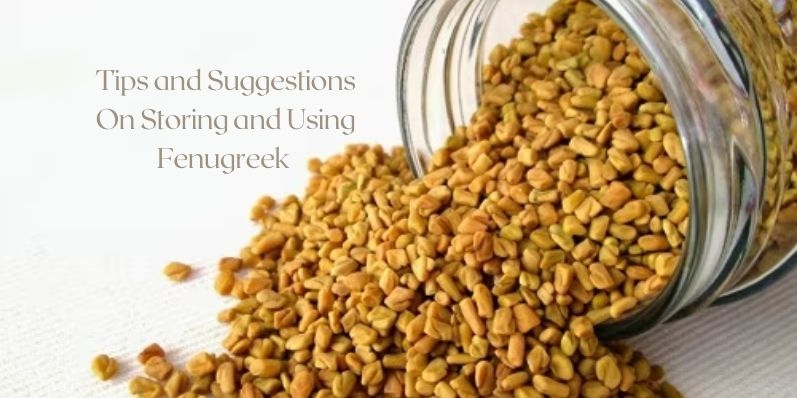
23-08-2023
Tips and Suggestions on Storing and Using Fenugreek
- Admin
Fenugreek, scientifically known as Trigonella Foenum-Graecum, is a versatile herb that has been used for centuries for its culinary and medicinal properties. With a distinct aroma and a slightly bitter taste, fenugreek adds a unique flavor to dishes and offers a range of health benefits. To make the most of this herb, proper storage and usage techniques are essential. In this guide, we'll explore tips and suggestions on storing and using fenugreek to ensure its freshness, flavor, and potency.
Storing Fenugreek:
Proper storage is crucial to maintain the flavor and potency of fenugreek. Here are some tips to help you store it effectively:
Choose Quality Fenugreek: Start with high-quality fenugreek seeds or dried leaves. Look for fresh, vibrant leaves or seeds without any signs of mold or moisture.
Opt for Whole Seeds: Whole fenugreek seeds tend to retain their flavor and aroma better than pre-ground powder. If possible, purchase whole seeds and grind them as needed.
Use Airtight Containers: Transfer fenugreek seeds or leaves to airtight containers to prevent air and moisture from degrading their quality. It's best to use glass jars or vacuum-sealed bags.
Avoid Heat and Light: Store fenugreek in a cool, dry, and dark place. Exposure to heat, light, and humidity can cause the herb to lose its flavor and aroma quickly.
Refrigeration Option: If you live in a humid climate or want to extend the shelf life, consider storing fenugreek in the refrigerator. However, ensure the herb is completely dry before sealing it in an airtight container to prevent mold growth.
Using Fenugreek:
Fenugreek offers a distinct flavor profile and numerous health benefits. Here's how you can use it effectively in your culinary endeavors:
Flavor Enhancer: Fenugreek's slightly bitter taste and nutty aroma make it a fantastic flavor enhancer. Add a pinch of ground fenugreek to curries, stews, and sauces to provide depth and complexity to the dish.
Homemade Spice Blends: Incorporate fenugreek into homemade spice blends like garam masala or curry powder for an authentic Indian flavor.
Tempering: In Indian cooking, tempering spices in oil is a common technique. Add fenugreek seeds to hot oil along with other spices before adding vegetables or lentils for a burst of flavor.
Bread and Pastries: Fenugreek can be used in bread and pastry recipes to infuse a unique taste. Incorporate ground fenugreek into dough for bread, or use it in the seasoning for savory pastries.
Herbal Teas: Fenugreek tea is a popular herbal remedy. Steep fenugreek seeds in hot water, strain, and enjoy a soothing beverage that may aid digestion and offer other health benefits.
Sprouted Fenugreek: Fenugreek seeds can be sprouted and used in salads, sandwiches, or as a garnish. Sprouting enhances their nutritional value and reduces bitterness.
Hair and Skin Care: Fenugreek is known for its potential benefits for hair and skin health. Create a hair mask by soaking fenugreek seeds overnight and blending them into a paste. Apply to your scalp for potential hair growth and conditioning benefits.
Nutritional Supplements: Fenugreek supplements, available in various forms like capsules and powders, are used to support lactation in breastfeeding mothers and potentially regulate blood sugar levels.
Culinary Experimentation: Don't be afraid to experiment with fenugreek in various dishes. Its unique flavor can add a delightful twist to both traditional and fusion recipes.
In conclusion, fenugreek is a versatile herb that can elevate your culinary creations while offering potential health benefits. By storing it properly in a cool, dry place and using it creatively in your cooking, you can make the most of this fragrant and flavorful herb. Whether you're exploring Indian cuisine or simply looking to expand your flavor horizons, fenugreek is a wonderful addition to any kitchen.